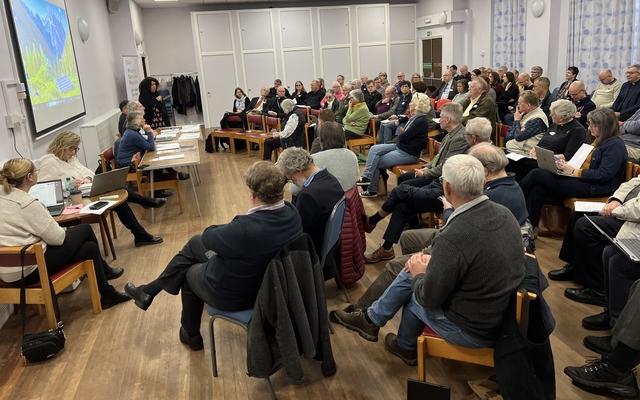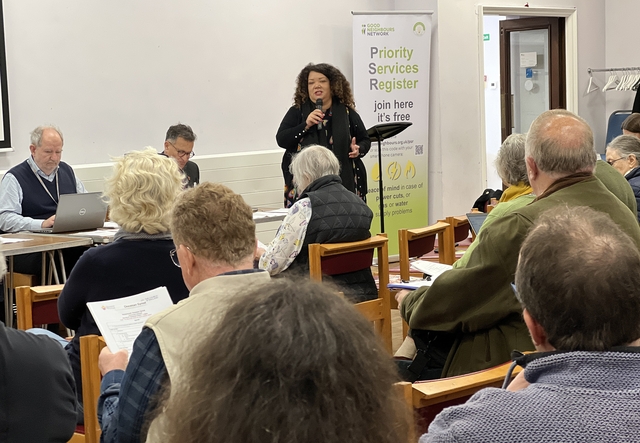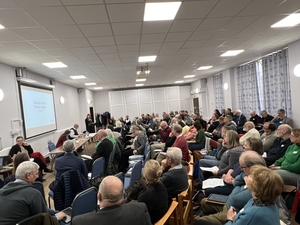
Diocesan Synod, November 2025
PRESIDENTIAL ADDRESS
Bishop Jonathan reflected on issues relating to money, sex and power that threaten our unity as a Church, especially focussing on recent developments in the Living in Love and Faith (LFF) process. He went on to describe how Jesus’s prayer in John 17 specifically highlights unity as one of the ways in which we might demonstrate God’s love to the world. And he described how our vision of the Church – the ecclesial world – should be expanded, and based on relationship rather than proposition. He described our unity as “a gift, not a task”.
The bishop also welcomed two of our Honorary Assistant Bishops - the Rt Rev Geoff Annas, former Bishop of Stafford, and the Rt Rev Luke Irvine-Capel, Bishop of Richborough - to the meeting.
PORTSMOUTH CITY OF SANCTUARY
Synod members gave a warm welcome to Shamila Dhana, from Portsmouth City of Sanctuary, a humanitarian organisation committed to helping asylum seekers and refugees. They use some churches as bases for their activities, including the Kitchen of Hope at St Simon’s Church, and a drop-in at All Saints, Commercial Road. She described her own background, arriving from Zimbabwe 20 years ago, and the welcome she received from churchgoers.
Shamila also addressed recent issues outside the Royal Beach Hotel, which houses around 150 asylum seekers, including single men, single women and families – there are around 30 children living there. She told synod that residents are given £8/week to live on, as well as a standard diet of food. Regular loud protests outside the hotel had left families distressed, and some chose not to leave the hotel often as a result.
In answer to questions, she outlined how churches could help with contributions of books and Christmas presents, and how children are able to attend local schools. Find out more here, and read what the city's two bishops thought of recent protests here.

SAFEGUARDING
Diocesan secretary Philip Poulter presented a paper from Head of Safeguarding Emily Hassan about the results of the independent INEQE safeguarding audit, which was published in September. You can download the paper here, and read more about the audit itself here.
Among the comments were those about a data breach by a law firm working on behalf of the national CofE’s Redress Scheme, about the INEQE recommendation that a suffragan bishop is appointed for the Isle of Wight, and about the administration of DBS checks.
NET ZERO CARBON ACTION PLAN
Diocesan environment officer David Cain presented an update on the net zero carbon action plan, using a presentation that you can download from here. Although the presentation includes a comparison in carbon emissions between 2022 and 2023 (the latest available figures), in fact a direct comparison can’t quite be made as the 2022 figures were extrapolated from a 17 per cent return across the diocese, whereas the 2023 figures are based on a 100 per cent return. There had been reductions in oil usage and gas usage in church buildings, and some ‘quick wins’ in replacing lighting with LED lights.
We have three ‘demonstrator churches’ in the diocese, including St Jude’s, Southsea, where solar panels have been installed, and a ‘demonstrator vicarage’ at Steep, which now has an air source heat pump, triple-glazing, solar panels and better insulation. These improvements are funded by the national CofE.
STANDING ORDERS REVISION
Synod members were given the chance to consider revisions to the Standing Orders that govern the business of Diocesan Synod. You can download that document from here. However, the version that was coming to this Synod still needs some fine-tuning from Bishop’s Council, so another version will also be presented at the next meeting.
GENERAL SYNOD UPDATE
General Synod member Ian Johnston presented a report of the July meeting of our General Synod, mentioning specific debates about Thy Kingdom Come, Guidelines for the Professional Conduct of Clergy, the Assisted Dying (End of Life) bill, and ‘Project Spire’, which deals with how the Church benefitted from historic transatlantic slavery.
He also spoke about where the power resides within the national Church with regard to diocesan finances, noting the increase in funding allocated by the Church Commissioners for the next triennium in 2026-28. And he also touched on the reorganisation of the national CofE’s governance structures, with the proposed replacement of the Archbishops’ Council by a new body – the Church of England’s National Services.
Find out more about General Synod here, and about the July 2025 sessions here.
BUDGET 2026
Synod members watched a video recorded by Bishop Jonathan addressing why they were being asked to agree a budget for 2026 which includes a £1.2m deficit. You can watch that video here:
Head of Finance Elaine Coe presented an update on our income and expenditure for 2025, and you can see her presentation here. The forecast was for our deficit for 2025 to be approximately £1.3m (before transfers from other funds), which was within our budget forecast range. She also reported that payment of parish share was 0.5 percentage points higher for the 10 months to October 2025 than it was 12 months ago. Our investment income was higher than expected, but our rental income was falling, as we appointed more clergy.
She outlined the picture nationally, as the majority of dioceses are forecasting significant deficits. The changes in national funding and the increases in clergy stipends would affect our budget for 2026, as outlined by the bishop. There is some transitional funding available to help dioceses to cope with these changes, but we are still budgeting for a £1.2m deficit for 2026.
Elaine presented the Budget proposal for 2026, which you can read here. She said it would assume an 88 per cent collection rate of parish share, as a more realistic assumption, with an overall increase of three per cent in the total amount of parish share to be requested across the diocese. Any change in the amount any individual parish would be asked to contribute would be capped at five per cent. There is the possibility of some alleviation of this deficit, with a further £500k potentially being available via SMMIB in the next triennium, but full figures are yet to be released.
Questions and comments from synod members included how much we hold in cash reserves, details of our ethical investment policy, and what difference it would make to have a 100 per cent collection rate. Synod members unanimously approved the budget for the Diocesan Board of Finance for 2026, and approved the budget for parish share of £5,541,000, with an expected collection rate of 88 per cent.
FOLLOWING MOTION
Following the debate on the budget, Ian Johnston proposed a following motion, which acknowledged the work of the Triennium Funding Working Group in allocating funding for 2026-28, but requested the Archbishops’ Council and other bodies should consider urgently a better process for enabling accountable funds for stipends to be released to dioceses. It also noted that the budget failed to address the issue of parish and diocesan financial fragility to the degree necessary. The motion was passed.
